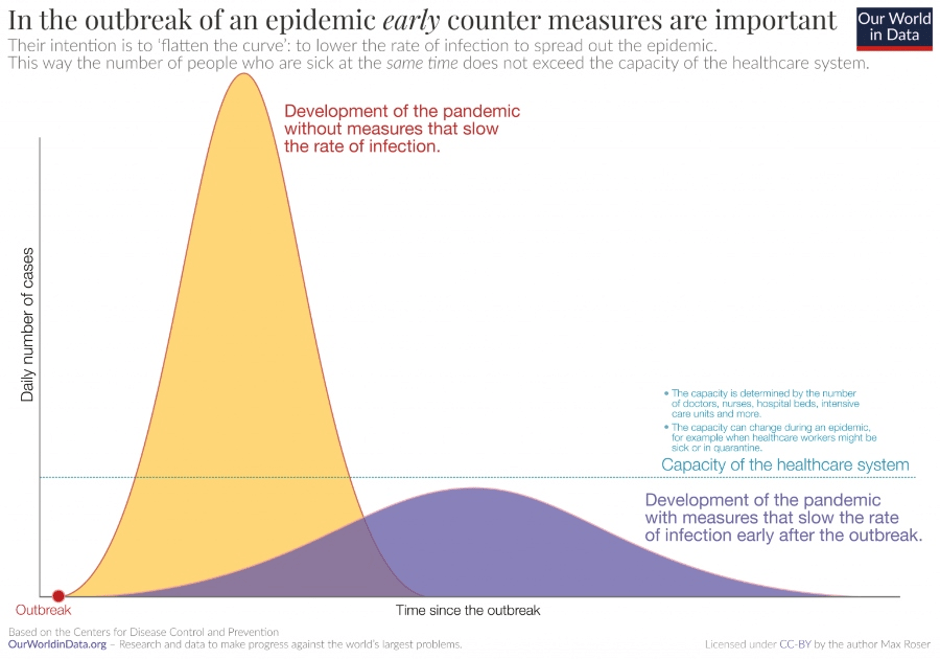Cultural Differences and the Coronavirus
[4-min read]
Are you also sick and tired of all the news about the Coronavirus or COVID-19?
Well, I can imagine. Here in Belgium, where I live, we’re in a semi-lockdown, as in many countries around the world. So from a distance, it seems like the whole world unites and takes the same measures.
In this article, I want to shine some light on the Cultural Differences and the Coronavirus battling this worldwide crisis.
The Main Purpose of Containment
The main reason for containing this virus has all to do with not overstretching our healthcare systems. As the graph below clearly illustrates.

With the approach of containment or lockdown, the hope is that the peak will be lower, with the trade-off that the whole episode will take longer before it is over.
Let’s talk a bit more about Cultural Differences and the Coronavirus.
Four Primary Dimensions of Culture
When it comes to cultural differences and the Coronavirus, we have to look at 4 dimensions of primary culture.
In an earlier article on this website, I’ve written about the four primary dimensions of culture:
- Hierarchy
- Loyalty (or Individualism)
- Goal orientation
- Predictability
In this article, I want to link the different responses to Corona to any or more of these dimensions. If you’re not familiar with the core characteristics of these dimensions, you can read more about them here.
The Focus on Six Countries
In order to keep the discussion more relevant and “containable” (no pun intended), I will focus on 6 countries:
- China
- Italy
- The USA
- The Netherlands
- France
- Belgium
Below you can find the relative scores on the first four dimensions of Culture of these countries.
| Hierarchy | Loyalty/Individualism | Goal Orientation | Predictability | |
| China | 80 | 28 | 68 | 25 |
| Italy | 52 | 77 | 70 | 76 |
| USA | 39 | 90 | 63 | 45 |
| The Netherlands | 34 | 81 | 17 | 50 |
| France | 65 | 75 | 49 | 88 |
| Belgium | 64 | 77 | 56 | 89 |
Let’s take one country at a time and assess their response to the Coronavirus in light of these dimensions. You will see a lot of cultural differences and the Coronavirus.

China
In China, the response was quite fast and drastic; complete cities, regions, and provinces were locked down.
The reason China was so fast and rigorous has to do with two dimensions: Hierarchy and Predictability.
- Hierarchy: With a very centralized government structure (a score of 80 on hierarchy) it is/was relatively easy to take such a massive decision. Also, because further down the government lines it still remains the same hierarchy: the boss (=the government in this case) decides and dictates.
- Predictability: The relatively low score on this dimension means that those central decisions can be made fairly easily without the need for thinking much ahead about how to structure and/or implement these measures. These structuring and implementation plans will come later.
Italy
A good friend of mine from Rome, Italy, keeps telling me, “Italy is a country in constant chaos“. And he’s got a point: Italy has had 65 governments since January 1946.
And this also showed in the response it was made towards this global virus. The three dimensions involved here are:
- Hierarchy: You would think Italy could make the same swift changes and interventions as China has done. But no. That was not the case. Why not? Because of the relatively high score on the second dimension, Loyalty/Individualism.
- Loyalty/Individualism: The combination of a high score on hierarchy and a high score on loyalty/individualism means that you will get few “islands” or “castles of power“. In other words, people (and in this case, political parties and politicians) will put their own agenda first (individualistic gain) over the national interest.
- Predictability: Last but not least there is a high score on this dimension. This means that there should be a plan first before implementing any decision. Without the plan, things become chaotic. And they have, which has led to the first European shutdown country.
The USA
The US, or rather President Trump, took the radical decision to close all flights from the 26 Schengen countries and later closed American airspace also for Ireland and the UK. Travelers from China and Iran were already not welcome earlier.
This unprecedented decision from the US President shows just how much power he has. But he only did that: stopped flights from entering the US. Which dimensions are at play here?
- Hierarchy: The US President is a very powerful man/position. But this time Trump only decided to close US air space. No other measures were taken. As of March 16, 2020, the mayors of New York and Los Angeles decided to close restaurants, bars, and cafes. In other words, these decisions were taken locally by local government institutions (and not top-down centrally like in China). In other words, this indicates a low score on Hierarchy.
- Predictability: The radical Presidential decision led to complete and total chaos at airports in the US and in European countries. There was no plan to streamline any of this. Americans generally don’t need a plan. Like the sports apparel company, Nike says: “Just Do It“.
The Netherlands
The Dutch were one of the last Western-European countries to take decisive action toward containing the virus. Saturday 14 & Sunday 15 March 2020 everything from restaurants to bars to sports clubs and schools was still open. People were not following the government’s advice to keep a so-called “Social Distance” from each other.
Even worse: there were a lot of visitors from Belgium where everything closed down a couple of days before that. Corona was having a ball…
Why did it take the Dutch government so long to take a decision?
- Hierarchy/Individualism: In general the Dutch are all in favor of an organized society and rules in general. Except… when it comes to the individual person. In other words, the 100 km/h speed limit is for everyone, except for me… So imposing rules in the Netherlands is difficult, because of the low score on Hierarchy and the high score on Individualism (Loyalty to self).
- Goal Orientation: The Dutch score quite low on this dimension. A low score indicates that a country/culture isn’t goal-oriented, but much more process-oriented. In other words, the goal is less important than the road toward the goal. The implication or characteristic that goes with this is that there is a lot of consensus-seeking going on. People talk, talk, talk, and talk a bit more. The Dutch share this process orientation with the Scandinavian countries.
In other words “You can tell a Dutch, but you can’t tell ‘m much“.
France/Belgium
The French took a more staged approach to taking measures. First, the schools closed and a couple of days later they decided to close cafes and restaurants. Dimensions?
- Hierarchy: The relatively high score on this dimension makes/made it possible to enforce the first level of measures easily. Followed by the second level of measures.
- Predictability: A plan needs to be in place. Different from the US, where the President’s decision caused chaos, the French took some time to come up with a plan. And they bought themselves some more time to make plans for the second wave of measures.
Where does Belgium fit in here? If you compare the scores of France and Belgium, you will notice that there are no significant differences between the two countries (any difference of more than 10 points is significant).
It was reported on the Belgium news that probably the French-speaking part/politicians were heavily influenced by what happened in France, which in turn influenced the Belgian federal government to take very similar decisions.
To Finalize this article about Cultural Differences and the Coronavirus
As you can see, even how the world is fighting this pandemic is not culturally neutral.
I just read on the news that Spanish police are forcing people to go to their homes if they’re on the beach or just walking in the streets without a good reason; Spain scores 58 on Hierarchy… This would never work in the Netherlands…
Looking for a Podcast Guest
I’m still looking for a podcast guest that can shed some more light on the Cultural Differences and the Coronavirus and/or on past global outbreaks and how different cultures/countries dealt with it differently.
If you are that person or if you know someone, please contact me here, and will gladly follow it up! Thanks!
Please leave your comments below. Thank you!
Last update: March 20, 2020
[focus words: covid-19, Cultural Differences and the Coronavirus, cultural differences]
Get a Taste of How Chris Presents, Watch his TEDx Talk
 Call Direct: +32476524957
Call Direct: +32476524957
 European Office (Paris) Whatsapp: +32476524957
European Office (Paris) Whatsapp: +32476524957
The Americas (USA; Atlanta, GA; también en Español): +1 678 301 8369
Book Chris Smit as a Speaker
If you're looking for an Engaging, Exciting, and Interactive speaker on the subject of Intercultural Management & Awareness you came to the right place.
Chris has spoken at hundreds of events and to thousands of people on the subject of Cultural Diversity & Cultural Competence.
This is What Others Say About Chris:
- “Very Interactive and Engaging”
- “In little time he knew how to get the audience inspired and connected to his story”
- “His ability to make large groups of participants quickly and adequately aware of the huge impact of cultural differences is excellent”
- “Chris is a dedicated and inspirational professional”
In addition, his presentations can cover specific topics cultural topics, or generally on Cultural differences.
Presentations can vary anywhere from 20 minutes to 2 hours and are given worldwide.
Book Chris now by simply sending an email. Click here to do so.
Read more about what Chris can do for you.
- Percentage of People Rating a Presentation as Excellent 86%
- Rating the Presentation as Practical 89%
- Applicability of Chris' presentation 90%
About Peter van der Lende

Peter has joined forces with Culture Matters.
Because he has years and years of international business development experience joining forces therefore only seemed logical.
Being born and raised in the Netherlands, he has lived in more than 9 countries of which most were in Latin America.
He currently lives in Atlanta, Georgia (USA) with his family.
You can find out more at https://expand360.com/
Or find out what Peter can do for you here.
- Performance Reviews and Appraisal System - 20 January 2026
- 199 AI, Leadership, and Cultural Differences with Crispin Thompson - 13 January 2026
- 198 Cultural Differences and Government with Maria Paula Correa - 18 November 2025

 Call Direct: +32476524957
Call Direct: +32476524957 European Office (Paris) Whatsapp: +32476524957
European Office (Paris) Whatsapp: +32476524957
Hi Chris
Really interesting information.
Do you data for Australia , UK and Singapore ? It would be interesting to compare. I think I know where they would fit but would be only guessing.
Donna
Thanks, Donna for your comment.
For reasons of keeping things simple, I only focused on a couple of countries in my article.
Let me try and answer your question:
Comparing to other European countries, the UK has taken the least restrictive actions (as of March 18, 2020). Slowly but surely there are more and more things being done (e.g. as of March 19, 2020, some London metro lines and metro stations will be closed).
One of the cultural reasons/explanations could be that the UK scores quite low on Predictability (36): people want few rules…
The same goes for Australia and New Zealand. Only on March 19, 2020, did those countries closed their border. This decision was also fueled by the fact that there are fewer and fewer airlines flying due to low and lower demand.
Singapore could/would follow the same cultural trend as China: Rules can be implemented, just like that. Just because the “Powerholder” can do this and it will be accepted. As you probably know, “Singapore is a ‘fine’ city”: You get fined for everything. Not because the Singaporeans want so many rules, no, simply because that same “Powerholder” dictates the way this city-state should be run.
I hope this makes sense and wonder what your own thoughts are/were.
Stay safe!
Hi Chris,
Interesting article, i find also the responses to CoVid-19 differ depending on cultures.
What i find interesting is the differing responses between Asian and Western cultures and people as a whole, but more from how the people themselves react rather than from a leadership perspective. In which case the cultural dimension Individualism vs Collectivism is most prominent. For example:
1. Wearing of face masks
Asian cultures are more concerned about the group and infecting others, hence, wear a face mask to stop the infections of others. Whereas people from western cultures being more individualistic don’t see the benefit of a face mask because, it doesn’t really protect the individual so why bother wearing it? Seems quite a selfish attitude but that’s how us Westerners behave. Face masks seem to spread panic in the West but in Asia are quiet normal and accepted.
2. Individual Freedom
Withdrawal of an individuals freedom to do things in the West is a much bigger issue than in Asia. If the government in China says self isolate people do it without question. To do this in the West is a much bigger issue and this is interesting also in how the different Western governments have implemented this. Italy, Spain and France have imposed punishments whereas Germany is still appealing to the tendency of German people to follow rules and adhere to the principles of Solidarity. The UK is up until now sending indirect messages for people to social distance themselves. I think we will see a change in strategy soon in the UK and Johnson will show more of is directive leadership style when the cases continue to go up exponentially.
In general it is a much bigger issue in the West to take away an individual’s freedom due to the culture of democracy, as it is in Asia, and this is causing a fundamental difference to the approach Western governments are taking compared to China and other Asian countries. I believe this cultural difference could be the major difference between success and failure in tackling the Coronavirus.
Best Regards,
Neil
Hi Neil,
Really good points. Thanks for the addition!
Another reader asked about the UK, Australia, and Singapore. I tried to reply to her question as well. Curious to hear if you agree.
HI CHRIS,
I FOLLOW YOUR PODCAST /NEWS LETTER WHENEVER I CAN…. INTERESTING ANALYSIS RE VIRUS ACTIONS.. WE WERE IN PORTUGAL WHERE THERE WAS VERY LITTLE BUT THE GOVERNMENT ACTED SUDDENLY LAST FRIDAY CLOSING SCHOOLS CAFES ETC NO DOUBT DUE TO THE SITUATION IN SPAIN WHERE THE LOCKDOWN WAS ALREADY BEING IMPLEMENTED… WE SPED BACK -FORGETTING THE FERRY IN BILBAO- BY DRIVING 2000KMS IN 2 DAYS TO GET TO THE TUNNEL IN CALAIS -WE HAVE FREQUENT TRAVELLER TICKETS SO NO PANIC! HOWEVER IT WAS INTERESTING TO SEE THAT SPANISH MOTORWAYS WERE EMPTY- PEOPLE WERE OBEYING GOVERNMENT ADVICE BUT IN FRANCE- WHERE SCHOOLS HAD BEEN CLOSED- THE WHOLE WORLD SEEMED TO BE ON HOLIDAY -THE SERVICE STATIONS WERE A NIGHTMARE -HEAVING WITH PEOPLE ALL GOING AWAY – PICNICKING MINGLING ENJOYING LIFE SEEMINGLY OBLIVIOUS “DON’T TOUCH MY FREEDOM”… THEN MACRON GOT MAD AT THE DISOBEDIENT CITOYENS -BUT HE HAD WANTED THEM TO VOTE N’EST-CE PAS??
IT WAS ALL VERY CONFUSING! IT IS ALWAYS GOOD TO GET TO YOUR COMFORT ZONE AND I WAS GLAD TO BE IN THE UK (INSPITE OF ALL THE CRITICISMS!!)
WE RETURNED TO ROOTS FROM 40 YRS ABROAD A YEAR AGO …. WHERE WOULD THE UK BE ON YOUR SCALE ? THE IDEA IS TO FLATTEN THE CURVE THUS SPREADING THE EPIDEMIC OUT AS THE NHS CANNOT COPE WITH AN ITALIAN SCENARIO – HUGE REGRETS WITH BREXIT PERHAPS -THEY (NOT WE!) WANTED TO STAND ALONE SO NOW WE SHALL.
Hi Jan,
Thank you for adding your comment and sharing your personal experience.
As I replied in an earlier comment, the UK is probably that took (because they’re taking them now) serious measures last. Culturally I would attribute that to the high score on Individualism (personal freedom is highly appreciated) and the low score on Predictability; “we want to live with as little rules as possible”.
As far as Brexit is concerned, I don’t think the UK will stand alone. This pandemic hits us all and isolating a country and not working together will not work.
But that’s only my personal opinion.
Thanks for your reply Chris
Certainly individualism and
I notice now our famous indirect communication is fast becoming very direct.
Perhaps we dislike rules but we do respect them as a whole
All the best
Jan
Hi Chris,i would like to ask where you have referenced the findings from ? e.g.any journals used
Hi Laura,
I use a model of culture (cultural dimensions) that I use to explain what is and has happened. You can find it here: https://culturematters.com/the-four-major-dimensions-of-culture/
For what has happened: I based myself on news sources like BBC & CNN.
Hopefully, this answers your question.
Hi Christ
Thanks for your interesting article.
I´d just like to check with you if the dimension “Goal Orientaiton” is Hofstede´s “Masculine v. Feminine
Dimension?
Thaks a lot.
Hi Pauline,
Yes, you’re right. Masculine/Feminine is my dimension called “Goal Orientation versus Process Orientation”.
I think that Hofstede’s names are very confusing; they’ve always led to discussions about Gender differences, which is not the essence of this dimension.
Changing it to Goal Orientation avoids this completely and is much more applicable.